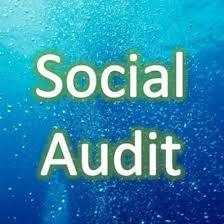Audits of a company's social compliance are an important tool that should be used by businesses to ensure that their day-to-day operations are carried out in a manner that complies with the ethical requirements in addition to the legal requirements. Businesses should use these audits to ensure that their operations are carried out in a manner that is consistent with the standards set forth by the law. Audits like these should be utilized by companies in order to guarantee that their operations do not violate any laws or ethical standards. Audits of this type help to identify areas in social, environmental, and labor practices that have room for some sort of development as well as potential dangers that may exist in those areas. These audits also assist in determining whether or not there are any potential threats present in those areas. Audits to ensure social compliance can take on a few different distinct forms, and businesses are free to use any of these audit types to evaluate the manner in which they are carrying out their operations. In the following paragraphs, we will discuss a few of the most common kinds of Social Compliance Audit Service that are performed today.
What are the many different kinds of checks for social compliance that can be performed?
Environmental Audits
Environmental audits investigate the impacts that a company has on the natural environment around it and determine whether or not the operations of the business comply with any environmental regulations that may be in place
Environmental audits are conducted by independent environmental auditors
These audits typically cover a variety of topics, including the management of waste, the consumption of water and energy, and emissions of greenhouse gases, to name a few of the more common ones
Audits of the natural environment are an absolute necessity if one wants to ensure that businesses are behaving in a responsible manner toward the environment and are taking steps to lessen the impact that they have on the natural environment that is around them
Audits of the environment are an absolute necessity
Investigations into the Working Conditions
Audits of labor practices investigate everything from the process of hiring new workers to the working conditions those workers are subjected to as well as the legal protections they are afforded in their roles as employees. These audits are being carried out with the purpose of establishing whether or not the organization is dedicated to maintaining fair labor practices such as non-discrimination, equitable compensation, and secure working environments. During these inspections, compliance with local, national, and international labor laws and regulations is also examined to ensure that the workplace is operating in accordance with all applicable laws and regulations. Investigating the working conditions at a company is one way to ensure that employees are treated fairly and that their fundamental rights are respected. This can be done by conducting investigations into the working conditions at a company.
Examinations Concerning the Social Obligations of an Individual
Audits of social responsibility examine to what degree a company is committed to operating in a manner that is ethically responsible for its industry. During these audits, the degree to which the organization adheres to ethical business practices, such as respecting human rights, maintaining transparency in operations and supply chain processes, and providing support to local communities, is examined. These are some examples of ethical business practices. Audits of the social responsibility practices of a company can help to ensure that the organization is not only in compliance with the regulations that govern the industry in which it operates, but that it is also making a contribution to the communities in which it does business. This is because audits of a company's social responsibility practices can help to ensure that the organization is in compliance with the regulations that govern the industry in which it operates.
Supplier Audits
Audits of suppliers evaluate the supply chain of the company and ensure that suppliers meet the same social, environmental, and labor standards as the company itself. Audits may focus on one or more of the following areas: social responsibility; environmental responsibility; labor standards. Audits may place an emphasis on social responsibility, environmental responsibility, or labor standards, among other potential areas of concentration. Evaluations are carried out during these audits to determine whether or not the suppliers are in compliance with the legal regulations, whether or not they adhere to the codes of conduct, and whether or not they practice transparency in their supply chains. Auditing a company's suppliers helps ensure that the company upholds ethical and environmentally responsible sourcing practices throughout its entire supply chain. This can be accomplished by ensuring that the company's suppliers are subjected to an audit. This can be accomplished by making certain that the company's suppliers are able to successfully complete the audit.
Examinations of the Methods and Policies Administered Concerning Health and Safety
Audits of health and safety evaluate the level of dedication shown by the company to the provision of safe and healthy working conditions for its workforce. Audits of health and safety evaluate the level of dedication shown by the company. Audits of health and safety measure how dedicated the company is to ensuring its employees' well-being. The purpose of these audits is to evaluate the company's workplace safety policies and practices, in addition to determining whether or not the organization is in compliance with health and safety regulations. Audits of health and safety procedures help to ensure that workers are not put in potentially dangerous situations unless Social Compliance Audit Service is absolutely necessary, and that the company is making efforts to improve workers' health. Audits also help to ensure that the company is following all applicable laws and regulations. This can be accomplished by ensuring that workers are not placed in potentially dangerous situations that aren't absolutely essential for the operation of the business.
When conducting a social audit, what do you consider to be the four most important aspects of a society to investigate?
Work Environment and ConditionsThis section covers the employment practices of the company, including compliance with labor laws, wages and benefits, working conditions, employee health and safety, and workers' rights such as freedom of association and non-discrimination. In addition, this section discusses the working conditions of the employees. In addition to that, the terms of employment of the staff members are discussed in this section. In addition to the topics covered here, this section also discusses employee health and safety laws, working conditions, wages and benefits, and working conditions.
In this section, the impact that the company has had on the environment is discussed. Topics covered include emissions, waste, energy, and water consumption, as well as the environmental management systems and policies that are currently in place within the organization. Impact on the Environment: This part of the report discusses the effect that the business has had on the surrounding environment.
Participation in Community Activities:This section discusses the social responsibility of the company, which includes its involvement in the community, its support of social programs, and its philanthropic efforts, among other related topics. In addition to that, it talks about the charitable activities that the company participates in. In addition to this, it discusses the impact that the company has had on the surrounding community, including how it has communicated with the various local stakeholders and engaged with them.
The moral and trustworthy operation of a company's business is what is meant by "business ethics" when applied to the context of a commercial enterprise. This encompasses a wide range of topics, some of which are the suppression of bribery and corruption, the upholding of ethical standards, and the administration of supply chains. This section may also include an analysis of the company's human rights policies and procedures, as well as the impact those policies and procedures have had on human rights issues such as the use of child labor and forced labor. Additionally, this section may include information regarding the company's efforts to address human rights issues. In addition, this section may contain information regarding the actions taken by the company to address concerns pertaining to human rights.








